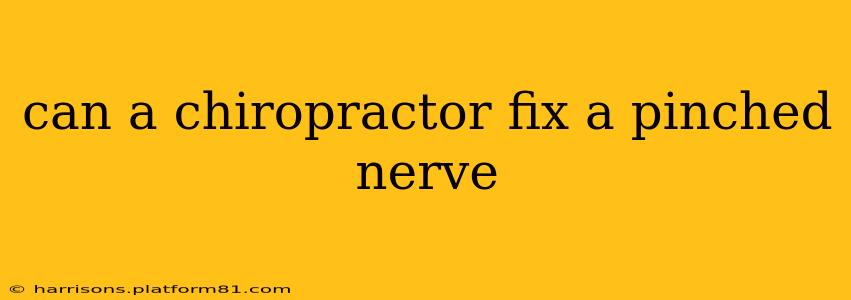A pinched nerve, also known as a compressed nerve, occurs when surrounding tissues, such as bones, cartilage, muscles, or tendons, put pressure on a nerve. This pressure can cause pain, numbness, tingling, and weakness in the area supplied by the affected nerve. Many people wonder if a chiropractor can help alleviate these symptoms. The answer is nuanced and depends on several factors.
While chiropractors don't "fix" a pinched nerve in the sense of surgically repairing it, they can often effectively treat the symptoms and improve the underlying condition that's causing the compression. Their approach focuses on restoring proper alignment of the spine and joints to relieve pressure on the nerves.
How Chiropractors Treat Pinched Nerves
Chiropractic care for pinched nerves typically involves a combination of techniques aimed at reducing inflammation and improving nerve function. These may include:
-
Spinal manipulation: This involves gentle adjustments to the spine to restore proper alignment and reduce pressure on the affected nerve. The goal is to correct subluxations – misalignments of the vertebrae that can impinge on nerves.
-
Mobilization: This technique involves gentler movements of the spine compared to manipulation. It’s often used when manipulation isn’t appropriate due to the patient's condition.
-
Soft tissue therapy: Techniques like massage can help relax tense muscles surrounding the affected nerve, reducing pressure and improving blood flow to the area.
-
Stretching and exercise: Specific exercises and stretches are prescribed to improve flexibility, strengthen supporting muscles, and improve posture, all of which contribute to reducing nerve compression.
-
Lifestyle advice: Chiropractors might advise on posture correction, ergonomic adjustments at work or home, and weight management, all of which can play a significant role in preventing further nerve compression.
What Conditions Might Benefit From Chiropractic Care for Pinched Nerves?
Chiropractic care can be beneficial for pinched nerves resulting from various conditions, including:
-
Cervical radiculopathy (neck pain radiating down the arm): This often results from nerve compression in the neck. Chiropractic adjustments can help alleviate pain and improve function.
-
Lumbar radiculopathy (lower back pain radiating down the leg – sciatica): Similar to cervical radiculopathy, chiropractic care can help relieve sciatica pain and improve nerve function.
-
Thoracic outlet syndrome: This involves compression of nerves and blood vessels in the space between your collarbone and first rib. Chiropractic adjustments can sometimes help relieve symptoms.
-
Carpal tunnel syndrome: While often managed with splinting and surgery, some cases of carpal tunnel syndrome (nerve compression in the wrist) might respond favorably to chiropractic adjustments aimed at improving overall upper body alignment and reducing nerve stress.
When to See a Doctor Instead of (or in Addition to) a Chiropractor
While chiropractic care is often effective, it's crucial to understand its limitations. You should see a medical doctor if:
- Your symptoms are severe or worsening. Severe pain, numbness, weakness, or bowel/bladder dysfunction requires immediate medical attention.
- You have neurological deficits. This includes muscle weakness or loss of sensation that doesn't improve with conservative care.
- Your pain is accompanied by fever, chills, or other systemic symptoms. These could indicate a more serious underlying condition.
- You have a known underlying medical condition that could be contributing to the pinched nerve. Your doctor can help determine whether chiropractic care is safe and appropriate in your case.
It is important to note that a chiropractor is not a replacement for a medical doctor. They work alongside medical professionals to provide holistic care. Many find chiropractic care a valuable adjunct to medical treatment, providing relief from pain and improving function.
Can a chiropractor help with a herniated disc causing a pinched nerve?
A herniated disc can indeed cause a pinched nerve, leading to significant pain and discomfort. Chiropractic care might help manage the symptoms associated with a herniated disc-related pinched nerve, but it’s crucial to understand that it won't necessarily repair the herniated disc itself. Chiropractic treatment might focus on reducing inflammation, improving spinal alignment to reduce pressure on the nerve, and improving overall mobility to lessen pain and discomfort. However, in severe cases, surgical intervention might be necessary.
What are the risks of chiropractic care for pinched nerves?
As with any medical intervention, chiropractic adjustments carry some potential risks, though they are generally low. These may include temporary soreness, stiffness, or headaches. Rarely, more serious complications can occur, such as a stroke (although this is extremely rare and often linked to pre-existing conditions). A qualified and experienced chiropractor will thoroughly assess your condition before recommending treatment and will discuss potential risks and benefits with you.
Conclusion
Chiropractic care can be a valuable part of a comprehensive treatment plan for a pinched nerve, effectively addressing the symptoms and improving the underlying condition in many cases. However, it's essential to consult with both a medical doctor and a chiropractor to determine the best course of action for your specific situation. Always remember that early diagnosis and appropriate management are key to preventing long-term complications.
